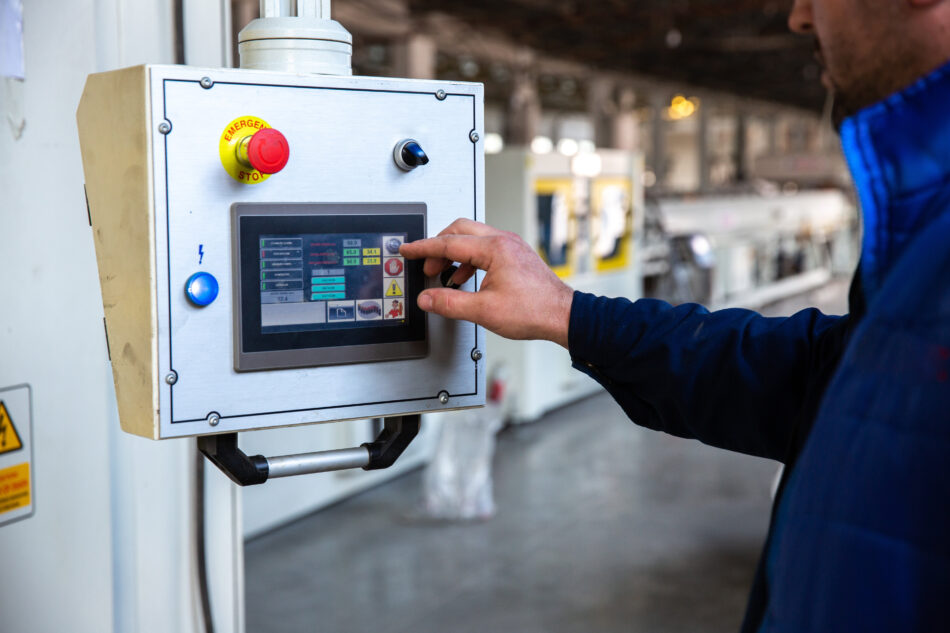For over a decade, automation tools have taken over almost all industrial control processes.
In today’s competitive landscape, businesses must balance the need to increase output and efficiency with the equally important goals of cost optimization, meeting rising demand, and ensuring profitability.
Industrial automation help businesses achieve operational efficiency and profitability. It does this by streamlining processes, reducing costs, and ensuring consistent quality and safety.
Industrial Automation solutions include Programmable Logic Controllers, Human Machine Interfaces, AC drives, Soft Starters, and SCADA.
A Programmable Logic Controller (PLC) is the brain of an industrial automation system. Think of it as a rugged, specialized computer designed to control manufacturing processes and machinery. Unlike a traditional computer, a PLC is built to operate reliably in harsh industrial environments with extreme temperatures, dust, and vibrations.
It offer precise control over operations, reducing human error. From simple on-and-off commands to continuously monitoring processes, they also safeguard machinery from unexpected faults.
Let’s move forward to understand PLCs better and their role in automating industrial processes.
How do PLCs Improve Reliability in Operations?
In the industries, reliability means that machines are running without failure. PLCs are designed to ensure consistent and accurate cycles even under the harshest of conditions. Rarely does their functioning falter for any reason. Their performance over extended hours remains stable, a key reason for the widespread adoption of automation.
This functionality makes the PLC a central component in modern factories and plants. For example, in a simple conveyor belt system, a PLC would receive a signal from a sensor when a product is in place. Based on this input, it would then command the motor to start or stop the conveyor belt to move the product to the next stage.
By providing real-time control, reliability, and the flexibility to be reprogrammed for different tasks, PLCs have become essential for increasing operational efficiency, productivity, and safety across a wide range of industries.
What Makes PLCs Efficient for Machine Control?
Machine control efficiency means achieving equivalent or greater output while utilising fewer resources judiciously. Programmable Logic Controllers demonstrate excellence in this regard by optimising processes and minimising wastage. In fact, when it comes to calibrating motor velocities, regulating energy usage, and multitasking multiple operations simultaneously, they stand out as one of the top industrial automation solutions.
How do PLCs Enable Real-time Decision-making?
Another valuable benefit that PLCs bring to the table is their response time. When it comes to catching sudden changes in operative conditions, they are quick to do so. It can be anything like a rapid temperature rise, a surge in demand, or an equipment failure. This feature is primarily leveraged to avoid costly escalations.
For industries where split-second decisions are mission-critical, such as food processing and automotive assembly, PLCs ensure smooth operations. With PLCs in the picture, businesses have a reliable replacement for manual intervention.
Why are PLCs Important for Safety and Error Reduction?
Safety is one thing every industry has to think about. Machines that work without proper protections can pose hazards to workers and even assets. PLCs have their own safety responses. They can halt equipment functioning when unsafe conditions occur, trigger alarms, and initiate emergency-stop functions when required. Moreover, PLCs help minimise human error in repetitive or crucial operations.
How do PLCs Support Scalability in Industries?
After some time, all businesses look for options to either expand or diversify their operations to increase their output ultimately. In such situations, traditional control systems struggle to keep pace with the changing demands. Conversely, the picture is entirely different when it comes to PLCs. They gather information, and the operator can schedule maintenance accordingly, thus saving costs and ensuring uninterrupted production.
What Role do PLCs Play in Reducing Downtime?
Industrial automation is all about ensuring fewer downtimes, which ensures profitability and output. PLCs, here, fulfil the purpose via predictive monitoring and diagnostic tools. As soon as any potential faults are detected, the operators get alerted. Consequently, it allows maintenance scheduling prior to any mechanical failure occurrence. This is a cost-effective tool, especially for the pharmaceutical and food industries, where uninterrupted operations are essential for output quality.
How do PLCs Integrate With Modern Technologies?
In the past, factories were essentially mechanical units. However, today the picture is quite different. They have evolved into seamless, functional digital ecosystems where machines, sensors, and systems are integrated and operate together. In fact, PLCs facilitate an effortless integration among software such as SCADA, IoT devices, and advanced sensors.
This integration is the modern approach to setting up smart factories, enhancing operational visibility, and facilitating data-driven decision-making. In the broader context of industrial automation, PLCs are the interface between physical machines and digital smarts.
Conclusion
PLCs are essential for efficient and reliable machine performance. They ensure a safe working environment, reduce downtime, and facilitate effortless scalability for integration with new technologies. These benefits speak for themselves.
For companies striving to maintain their market position and achieve a high level of operational efficiency, implementing PLC-based systems is essential. The key to success is to work with experienced professionals such as Lauritz Knudsen Electrical & Automation.
Their value-adding industrial automation solutions offer several advantages, and given their 70-year-old legacy, they listen and innovate with and for you.
Read Also: How Energy Management Systems are Powering a Sustainable Industry








